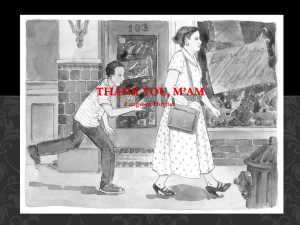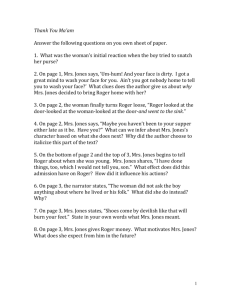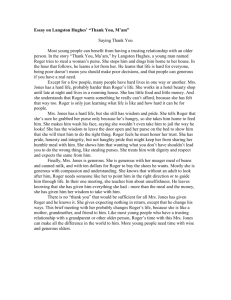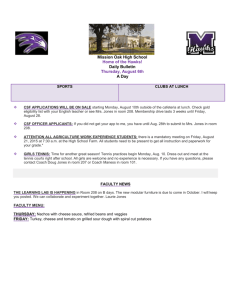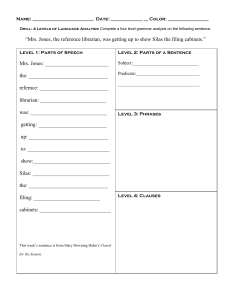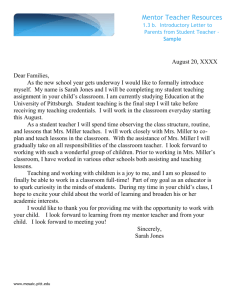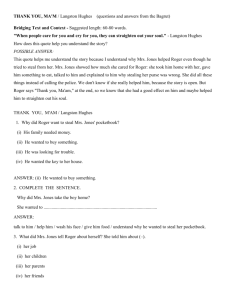File - AYELET RAZ ENGLISH
advertisement
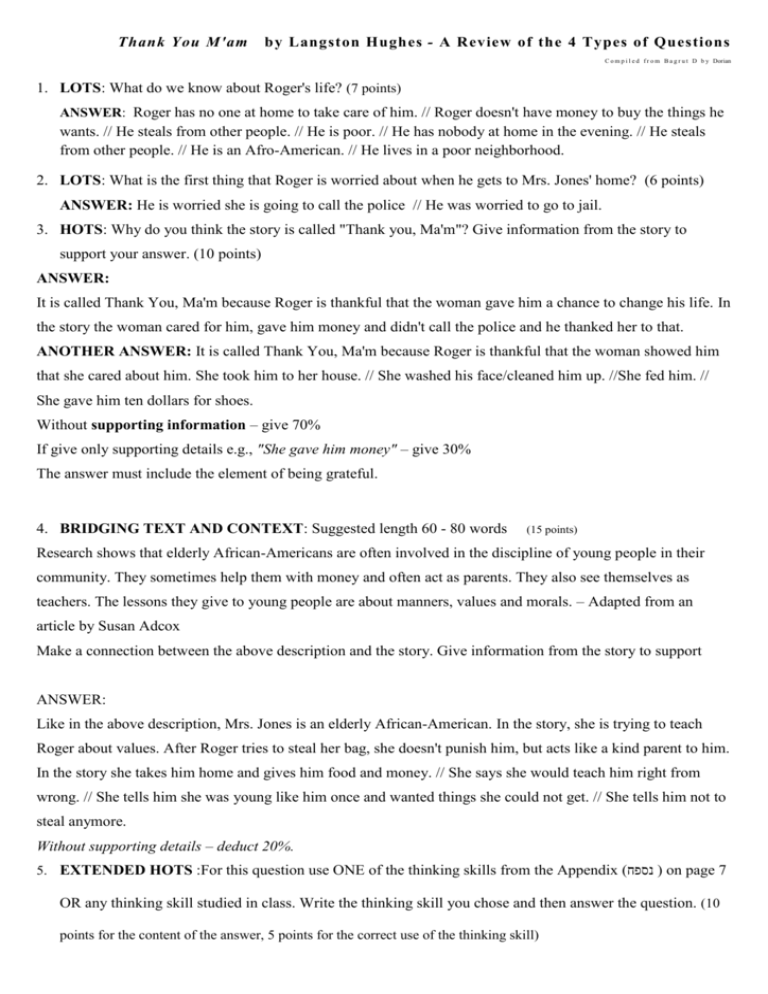
Thank You M'am by Langston Hughes - A Review of the 4 Types of Questions C o m p i l e d f r o m B a g r u t D b y Dorian 1. LOTS: What do we know about Roger's life? (7 points) ANSWER: Roger has no one at home to take care of him. // Roger doesn't have money to buy the things he wants. // He steals from other people. // He is poor. // He has nobody at home in the evening. // He steals from other people. // He is an Afro-American. // He lives in a poor neighborhood. 2. LOTS: What is the first thing that Roger is worried about when he gets to Mrs. Jones' home? (6 points) ANSWER: He is worried she is going to call the police // He was worried to go to jail. 3. HOTS: Why do you think the story is called "Thank you, Ma'm"? Give information from the story to support your answer. (10 points) ANSWER: It is called Thank You, Ma'm because Roger is thankful that the woman gave him a chance to change his life. In the story the woman cared for him, gave him money and didn't call the police and he thanked her to that. ANOTHER ANSWER: It is called Thank You, Ma'm because Roger is thankful that the woman showed him that she cared about him. She took him to her house. // She washed his face/cleaned him up. //She fed him. // She gave him ten dollars for shoes. Without supporting information – give 70% If give only supporting details e.g., "She gave him money" – give 30% The answer must include the element of being grateful. 4. BRIDGING TEXT AND CONTEXT: Suggested length 60 - 80 words (15 points) Research shows that elderly African-Americans are often involved in the discipline of young people in their community. They sometimes help them with money and often act as parents. They also see themselves as teachers. The lessons they give to young people are about manners, values and morals. – Adapted from an article by Susan Adcox Make a connection between the above description and the story. Give information from the story to support ANSWER: Like in the above description, Mrs. Jones is an elderly African-American. In the story, she is trying to teach Roger about values. After Roger tries to steal her bag, she doesn't punish him, but acts like a kind parent to him. In the story she takes him home and gives him food and money. // She says she would teach him right from wrong. // She tells him she was young like him once and wanted things she could not get. // She tells him not to steal anymore. Without supporting details – deduct 20%. 5. EXTENDED HOTS :For this question use ONE of the thinking skills from the Appendix ( ) נספחon page 7 OR any thinking skill studied in class. Write the thinking skill you chose and then answer the question. (10 points for the content of the answer, 5 points for the correct use of the thinking skill) Mrs. Jones tells Roger, "I have done things, too, which I would not tell you, son... Everybody's got something in common"? How does this quote change our opinion of Mrs. Jones? Give information from the story to support your answer. (15 points) Thinking skill I chose.............................................................................. ANSWER: Comparing and contrasting: This quote helps me make a comparison between Mrs. Jones and Roger. She was not that different from Roger when she was young. She has changed her life. If Mrs. Jones can change, so can Roger. // תשובה נוספת: This quote helps me make a comparison between how Mrs. Jones was in the past and how she is now. We think of Mrs. Jones as an honest, hard-working person. Now we realize that she was like Roger in the past. She did things she wasn't proud of and she changed her life. Inferring: I inferred that Mrs. Jones changed her life. I thought that she was a decent woman, but I learned that she, too, did bad things. Today, Mrs. Jones has her own room and she has a job in a beauty shop. Inferring: This quote changed our opinion of Mrs. Jones. In the beginning of the story we thought that she only wanted to kick Roger / punish him. I can infer that she made mistakes when she was young. When Roger arrived at her house, she wanted to teach him not to repeat the mistakes she had made. Distinguishing different perspectives: In the beginning of the story we think that Mrs. Jones is a positive, hard working woman. The quote makes us change our perspective on Mrs. Jones. We understand that when she was young she also did bad things. But at the end of the story our view of her is good because she treated Greg kindly, gave him food and 10 dollars to buy the shoes he wanted. Without supporting information – give 70% If do not mention the HOTS – deduct 5 points 6. HOTS question with TWO parts: 6. a. "When they were finished eating, she got up and said, 'Now, here, take this ten dollars and buy yourself some blue suede shoes.' ". Why do you think she did this? (7 points) ANSWER: She wanted to be nice to him // She wanted to help him change his behavior. // She wanted to show him that you don't have to steal, you can ask. // She wanted to teach him a lesson. 6. b. "The woman did not watch the boy to see if he was going to run now..." What effect did this have on Roger? Give information from the story to support your answer. (8 points) ANSWER: b. Roger understood that the woman trusted him. He didn't want to disappoint her. He wanted to show her that he would not do anything to lose that trust. That is why in the story he sat on the far side of the room away from her purse where she could see him. THANK YOU, MA'M / Langston Hughes (questions and answers from the Bagrut) Bridging Text and Context - Suggested length: 60-80 words. "When people care for you and cry for you, they can straighten out your soul." - Langston Hughes How does this quote help you understand the story? POSSIBLE ANSWER: This quote helps me understand the story because I understand why Mrs. Jones helped Roger even though he tried to steal from her. Mrs. Jones showed how much she cared for Roger: she took him home with her, gave him something to eat, talked to him and explained to him why stealing her purse was wrong. She did all these things instead of calling the police. We don't know if she really helped him, because the story is open. But Roger says "Thank you, Ma'am," at the end, so we know that she had a good effect on him and maybe helped him to straighten out his soul. THANK YOU, M'AM / Langston Hughes 1. Why did Roger want to steal Mrs. Jones' pocketbook? (i) His family needed money. (ii) He wanted to buy something. (iii) He was looking for trouble. (iv) He wanted the key to her house. ANSWER: (ii) He wanted to buy something. 2. COMPLETE THE SENTENCE. Why did Mrs. Jones take the boy home? She wanted to .................................................................................................... ANSWER: talk to him / help him / wash his face / give him food / understand why he wanted to steal her pocketbook. 3. What did Mrs. Jones tell Roger about herself? She told him about (–). (i) her job (ii) her children (iii) her parents (iv) her friends ANSWER: (ii) her job 4. "... shoes got by devilish ways will burn your feet." What did Mrs. Jones mean by this? ANSWER: If the boy steals the money to buy shoes he will not enjoy them. / If he steals he will get punished somehow. 5. a. At the end of the story "The boy wanted to say something else other than, 'Thank you, M'am,' to Mrs. Luella Bates Washington Jones, but... he couldn't even say that." What else besides "thank you" do you think Roger wanted to say to Mrs. Jones? Explain. NOTE: For this question use ONE of the thinking skills from the Appendix ) (חפסנon page 13. Thinking skill I chose: .............................................................................. ANSWER: Possible thinking skill: Explaining cause and effect / Inferring Any other thinking skills are acceptable as long as they are supported by the text and can be explained in question 5b. Possible information that would be adapted according to the thinking skill chosen: He might want to say to her that her kindness had taught him a valuable lesson. / He might want to say that she changed his life because she made him see there are good people in the world / that she is the first person who ever really cared what happens to him. b. Explain why you chose this skill to answer question 5a. Your answer must refer specifically to the text. ANSWER: Possible explanations for thinking skills: Explaining cause and effect: I chose these HOTS because we have a cause: Mrs. Jones' kindness, which had the effect of making Roger feel more positive and hopeful / better about himself. Inferring: The story doesn't tell us what he wants to say so I have to infer it from the way he behaves towards Mrs. Jones at the end. 6. a. While he was washing his face in Mrs. Jones' room Roger realized: "The door was open. He could make a dash for it down the hall. He could run, run, run, run!" Why doesn't Roger run away? ANSWER: Possible information to be included in answer: He didn't want to disappoint her. / He was afraid of what she would think of him. / He wanted to show her he was a good person. b. How do you think the day with Mrs. Jones will change Roger? ANSWER: Possible information to be included in answer: • Now that he understands that there are kind people in the world he might trust other people more. / take Mrs. Jones' advice. • Roger has lived all his life in a bad neighborhood with mostly negative influences / parents who gave him a bad education. One day with a nice person isn't enough to make him change.
